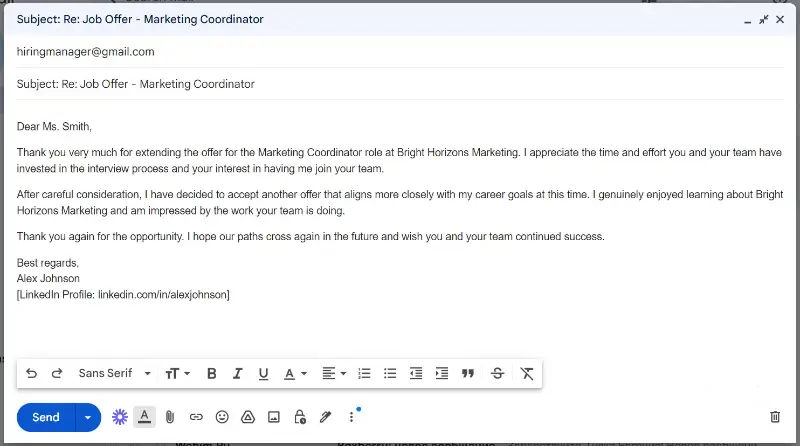Negotiating a compensation package can feel daunting, but knowing how to counter an offer on salary effectively can make a significant difference in your career.
Whether you've received a new job offer or seeking a raise, approaching the conversation with confidence and preparation is key.
In this article, we'll explore actionable strategies on how to write a counter offer like a pro and secure the compensation you deserve.
When to counter a salary offer?
While it’s common to feel unsure about when to initiate this conversation, understanding the appropriate moments to counter a job offer can boost your confidence. This can significantly increase your chances of success.
New job offer
A salary counter offer is most common when you’ve received an initial proposal but believe the pay does not reflect your skills, experience, or the market rate. In this case, waiting until you have the official offer in writing is crucial.
Internal promotions
When offered an internal promotion, it’s essential to assess whether the new role's compensation aligns with the expanded responsibilities.
Often, promotions within the company come with small incremental raises rather than significant salary jumps, which may justify a counter offer if the compensation doesn’t reflect the new level of work.
Annual reviews
Another key moment to salary counter offer is during annual performance reviews. If your performance has been strong, this is the time to leverage your achievements as a basis for negotiating a higher salary or additional benefits.
Employers often budget for raises during this time, so it's a strategic window for discussions.
After probation period
In cases where your employment contract includes a probation period, it’s appropriate to initiate salary discussions once that time ends.
If you’ve met or exceeded expectations, the probationary review is an ideal moment to negotiate better compensation.
Signs that it’s time to counter offer:
- You’ve researched the market, and the offer is below industry standards.
- The initial offer doesn’t reflect your level of experience and skillset.
- You've received a competing offer from another company with better compensation.
- The responsibilities of the role are more significant than initially described.
By recognizing these opportune moments, you can confidently begin the process of countering a job offer.
Preparation to counter offer salary
Begin by gathering data on the salary range for your role.
Resources like Glassdoor, Payscale, and LinkedIn Salary Insights can help you establish a reasonable range based on current trends.
Be specific about factors that influence the pay, such as company size, geographic location, and industry.
Next, evaluate your worth by considering your unique skill set, experience, and qualifications. Document your accomplishments, certifications, and specialized abilities that may set you apart from other candidates or colleagues.
The goal is to justify your request for a higher salary based on merit, not just market conditions.
Compile evidence that supports your value to the company.
This could include:
- Quantifiable achievements, such as sales figures, successful project completions, or efficiency improvements.
- Awards or recognitions that showcase your contributions.
- Testimonials or references from colleagues, supervisors, or clients.
- Certifications or advanced degrees that enhance your qualifications.
Before entering negotiations, decide on your target. Your job counter offer should aim for the higher end of the range but remain within reason.
For example, if market research shows your role’s salary typically ranges from $70,000 to $90,000, a counter offer at $85,000 may be more effective than pushing for the extreme high end without adequate justification.
How to counter offer salary?
Now that you’ve prepared your strategy, it’s time to implement it. Here’s a step-by-step guide on how to counter offer a job offer effectively.
Start with gratitude and enthusiasm
Always begin the conversation by thanking the employer for the offer. Show enthusiasm for the role and the company. For instance:
"Thank you so much for offering me the position. I’m really excited about the opportunity to work with the team and contribute to the company’s growth."
Present your research
Next, transition into the counter offer by presenting your research and reasoning. Keep your tone positive and constructive.
"After reviewing the offer, and based on my research of the market rate for similar roles in our industry and location, I was hoping we could discuss the salary. Given my years of experience and past achievements, I believe a salary of $70,000 would be more in line."
Remain open to negotiation
After stating your salary counter offer, express your willingness to discuss options.
"I’m happy to discuss this further and explore how we can find a mutually beneficial solution."

Focus on value
Emphasize the value you will bring to the organization. Highlight specific contributions you plan to make:
"In my previous role, I increased product sales by 19%, and I believe I can bring similar results here."
Stay professional and polite
Maintain professionalism throughout the discussion, even if the employer doesn’t immediately agree with your request. Avoid aggressive language, and keep the tone collaborative.
"I completely understand your budget constraints, and I’m happy to work together to find the right balance."
By approaching the counter offer for job with positivity and a well-reasoned argument, you increase the chances of reaching an agreement that works for both parties.
Tips for successful salary negotiations
Navigating salary negotiations can be challenging, but with the right mindset and tactics, you can maximize your chances of success. Here are some practical tips to guide you through the process:
1. Be clear
It’s important to communicate your expectations clearly. State your desired salary or range confidently but be prepared to justify it with data and achievements.
Ensure that your range is based on thorough market research to demonstrate that your ask is reasonable.
Based on my research and the industry standards for this role in our region, I’m seeking a salary between $85,000 and $95,000. In my previous role, I increased sales by 20%, which contributed significantly to company revenue.
2. Consider the full package
Salary is just one aspect of compensation.
Take into account other benefits such as:
- Health insurance. Employer-sponsored health insurance can save you thousands of dollars annually in premiums, out-of-pocket costs, and potential tax benefits.
- Retirement contributions (401k match). This is money that grows tax-deferred and can help you build wealth without you contributing beyond your own portion.
- Bonuses or commissions. For roles where variable pay is a significant component, such as sales or business development, these can sometimes outpace base salary.
- Stock options or equity. While not guaranteed, if the company performs well, they can far exceed a traditional salary increase in value over time.
- Paid time off or vacation days. PTO means more days you are paid without working, increasing the effective rate of pay per day worked.
- Flexible work arrangements. Remote work or flexible hours, can improve your work-life balance and reduce commuting or relocation costs.
You may be able to negotiate these non-salary benefits to increase the overall value of your compensation package.
Would it be possible to negotiate additional paid time off as part of the package?
3. Practice negotiating
If you’re new to negotiating, practice with a friend, mentor, or even in front of a mirror. Role-playing different scenarios can help you anticipate challenges and refine your approach.
Practicing will help you stay calm and articulate during the actual conversation.
Thank you for the offer. I was hoping for something closer to $90,000 given my experience and market rates. Is there flexibility to revisit the number?
4. Be prepared for a pushback
Employers may push back on your salary counter offer, which is why it’s essential to prepare for different responses.
I understand. In that case, can we explore options for additional bonuses, professional development opportunities, or an earlier salary review?
5. Remain confident
Confidence is key to successful negotiations, but it’s essential to strike the right balance between assertiveness and professionalism.
Avoid ultimatums or aggressive tactics that could damage the relationship with your employer. A calm, confident tone will help you come across as credible and reasonable.
I appreciate the offer and am excited about the role. I believe the salary we discussed reflects my skills and contributions fairly, and I’m happy to work together to find a solution that works for both sides.
These tips will help you navigate the negotiation process more effectively and increase your likelihood of success.
How to handle rejection of your counter offer?
Not all negotiations will go your way, and it’s possible that your salary counter offer may be rejected. However, how you handle this situation can make a significant difference in your relationship with the employer and your future opportunities.
Stay composed
Avoid expressing frustration or disappointment. Instead, express appreciation for the opportunity to discuss your compensation. You might say:
"I appreciate you considering my request. I understand that the offer is final, and I remain excited about the opportunity to contribute to the team."
Ask for feedback
Politely ask for feedback on why the salary counter offer was declined. This can help you gain insight into the company’s reasoning and potentially open the door for future negotiations.
"Could you provide any insight into the decision? I’d appreciate understanding the factors involved."
Explore other benefits
If the salary itself is non-negotiable, explore other areas where you might negotiate. This could include a signing bonus, additional vacation days, or a performance review with the possibility of a raise in six months.
Decide whether to accept the offer
If the salary offer remains below your expectations, you’ll need to decide whether to accept the position. Consider the overall package, company culture, growth opportunities, and whether the role aligns with your long-term career goals.
If the offer is significantly below what you believe is fair, it may be worth considering other options.
Stay open to future opportunities
If you decide to decline the offer, maintain a positive relationship with the employer. You never know when future opportunities may arise with the same company. Thank them for the chance and express interest in staying in touch.
"While I’ve decided to pursue other opportunities at this time, I truly appreciate the offer. I hope our paths might cross again in the future."
Conclusion
Countering a salary job offer is about valuing your worth and presenting a compelling case backed by research and self-assurance.
Whether you reach your ideal figure or find a middle ground, effective negotiation is a powerful skill that can enhance your professional development goals. Remember, the right approach can turn a good offer into a great opportunity.
Create your professional Resume in 10 minutes for FREE
Build My Resume






